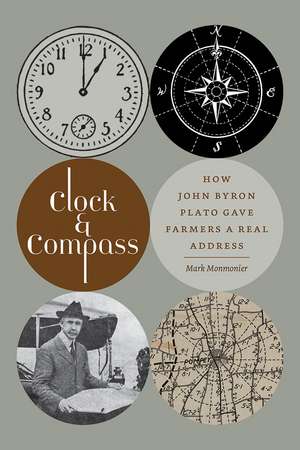Clock and Compass: How John Byron Plato Gave Farmers a Real Address
Autor Mark Monmonieren Limba Engleză Paperback – 11 apr 2022
Plato’s solution was a map-and-directory combo that used direction and distance from a local business center to give farmers a real address, just like city dwellers. He patented his invention called the “Clock System” and tried to sell it to the Post Office Department. What follows is a tale of persistence and failure as rural farming declined and technology and capitalism overtook John Byron Plato’s chances at geographic immortality.
Preț: 146.36 lei
Nou
Puncte Express: 220
Preț estimativ în valută:
28.01€ • 29.95$ • 23.35£
28.01€ • 29.95$ • 23.35£
Carte indisponibilă temporar
Doresc să fiu notificat când acest titlu va fi disponibil:
Se trimite...
Preluare comenzi: 021 569.72.76
Specificații
ISBN-13: 9781609388218
ISBN-10: 1609388216
Pagini: 196
Ilustrații: 12 b&w photos, 32 b&w maps, 11 b&w figures
Dimensiuni: 152 x 229 x 18 mm
Greutate: 0.25 kg
Editura: University of Iowa Press
Colecția University Of Iowa Press
ISBN-10: 1609388216
Pagini: 196
Ilustrații: 12 b&w photos, 32 b&w maps, 11 b&w figures
Dimensiuni: 152 x 229 x 18 mm
Greutate: 0.25 kg
Editura: University of Iowa Press
Colecția University Of Iowa Press
Recenzii
“A leading expert in twentieth-century cartography, Mark Monmonier has given us a thoroughly researched and engaging history of John Byron Plato and his ingenious, patented clock system for creating rural addresses. This is a must read.”—Judith Tyner, author, Women in American Cartography: An Invisible Social History
“Well-written, thoroughly researched, and richly illustrated, Mark Monmonier’s Clock and Compass is more than a simple tale of an entrepreneurial cartographer. The fact that Plato’s system was not widely utilized does not make the story less significant. Monmonier offers insight into geography and mapmaking, the changing social landscape of rural America, and government bureaucracy.”—J. L. Anderson, author, Capitalist Pigs: Pigs, Pork, and Power in America
“Well-written, thoroughly researched, and richly illustrated, Mark Monmonier’s Clock and Compass is more than a simple tale of an entrepreneurial cartographer. The fact that Plato’s system was not widely utilized does not make the story less significant. Monmonier offers insight into geography and mapmaking, the changing social landscape of rural America, and government bureaucracy.”—J. L. Anderson, author, Capitalist Pigs: Pigs, Pork, and Power in America
Notă biografică
Mark Monmonier is Distinguished Professor Emeritus of Geography and the Environment at Syracuse University’s Maxwell School of Citizenship and Public Affairs. He has authored twenty books, including How to Lie with Maps. He lives in Syracuse, New York.
Cuprins
Preface
1. No Real Address
2. Denver
3. Semper
4. Exploiters and Advocates
5. Ithaca
6. Ohio
7. Washington, DC
8. Camp Plato Place
9. Remission
10. Postmortem
Acknowledgments
Notes
1. No Real Address
2. Denver
3. Semper
4. Exploiters and Advocates
5. Ithaca
6. Ohio
7. Washington, DC
8. Camp Plato Place
9. Remission
10. Postmortem
Acknowledgments
Notes
Descriere
A city guy who aspired to be a farmer, John Byron Plato bought some farmland north of Denver, Colorado, and began raising Guernsey cattle, which he advertised for sale in the local paper. When an interested buyer eager to see his calves couldn’t find his farm, Plato realized that an RFD postal address was only good for delivering mail. Plato’s solution was a map-and-directory combo that used direction and distance from a local business center to give farmers a real address, just like city dwellers. He patented his invention called the “Clock System” and tried to sell it to the Post Office Department. What follows is a tale of persistence and failure as rural farming declined and technology and capitalism overtook John Byron Plato’s chances at geographic immortality.
